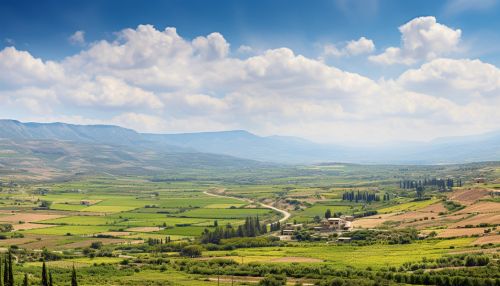Geography of Israel
Geography of Israel
Israel is a country located on the eastern shore of the Mediterranean Sea in the Middle East. Its geographical coordinates are approximately 31°N 35°E, and it is bordered by Lebanon to the north, Syria to the northeast, Jordan to the east, and Egypt to the southwest. The country also has a coastline on the Red Sea, with the port city of Eilat serving as a southern maritime outlet.
Topography
Israel's topography is varied and includes the Negev desert in the south, coastal plains along the Mediterranean, and the mountain ranges of the Galilee, Carmel, and the Golan Heights in the north. The central highlands include the Judean Hills and the mountains around Jerusalem. The Jordan Rift Valley, which is part of the larger Great Rift Valley, runs along the eastern edge of the country and includes the Jordan River, the Sea of Galilee, and the Dead Sea, the latter being the lowest point on Earth's land surface.
Climate
The climate of Israel is characterized by long, hot, and dry summers, and short, cool, and rainy winters. The country has a variety of climatic conditions, ranging from the temperate climate of the northern highlands to the arid climate of the Negev. The coastal areas enjoy a Mediterranean climate with humid summers and mild winters. Precipitation varies significantly across the country, with the north receiving more rainfall than the arid south.
Hydrology
Israel's main water sources include the Sea of Galilee, the Jordan River, and a series of aquifers. The country has faced water scarcity issues and has developed advanced water technology, including desalination, water recycling, and irrigation techniques, to manage its water resources. The Dead Sea, known for its high salinity and mineral-rich waters, is a terminal lake that is receding at an alarming rate due to water diversion and mineral extraction activities.
Flora and Fauna
The geography of Israel supports a wide range of flora and fauna, adapted to its various ecological zones. The Mediterranean region is home to maquis shrubland and pine forests, while the Negev desert has xerophytic vegetation adapted to arid conditions. The country's biodiversity includes species such as the Arabian oryx, the Griffon vulture, and the Israeli gazelle. Conservation efforts are in place to protect endangered species and their habitats.
Environmental Issues
Israel faces several environmental challenges, including water scarcity, air and water pollution, and loss of natural habitats due to urbanization and development. The country has implemented policies and initiatives aimed at environmental protection, such as promoting renewable energy, reducing greenhouse gas emissions, and enhancing sustainable development practices.
Demographics and Human Geography
The human geography of Israel is marked by a diverse population with a complex mix of ethnicities, religions, and cultures. Major cities include Jerusalem, Tel Aviv, and Haifa, each with its own unique geographical and cultural characteristics. The population distribution is uneven, with the majority residing in the coastal plain and central highlands, while the Negev remains sparsely populated.


Economic Geography
Israel's economy is technologically advanced and is known for its innovation in fields such as information technology, biotechnology, and water management. The country's economic activities are diverse, with agriculture, industry, and services all playing significant roles. Israel's geographical location has also made it a hub for trade and commerce in the region.
Political Geography
The political geography of Israel is complex, with ongoing disputes over borders and territories. The status of Jerusalem, the West Bank, the Golan Heights, and other areas remain contentious issues in regional and international politics. Israel's geopolitical situation has a significant impact on its relations with neighboring countries and the broader Middle East.
